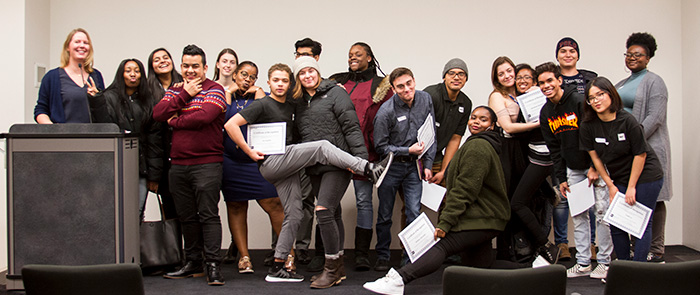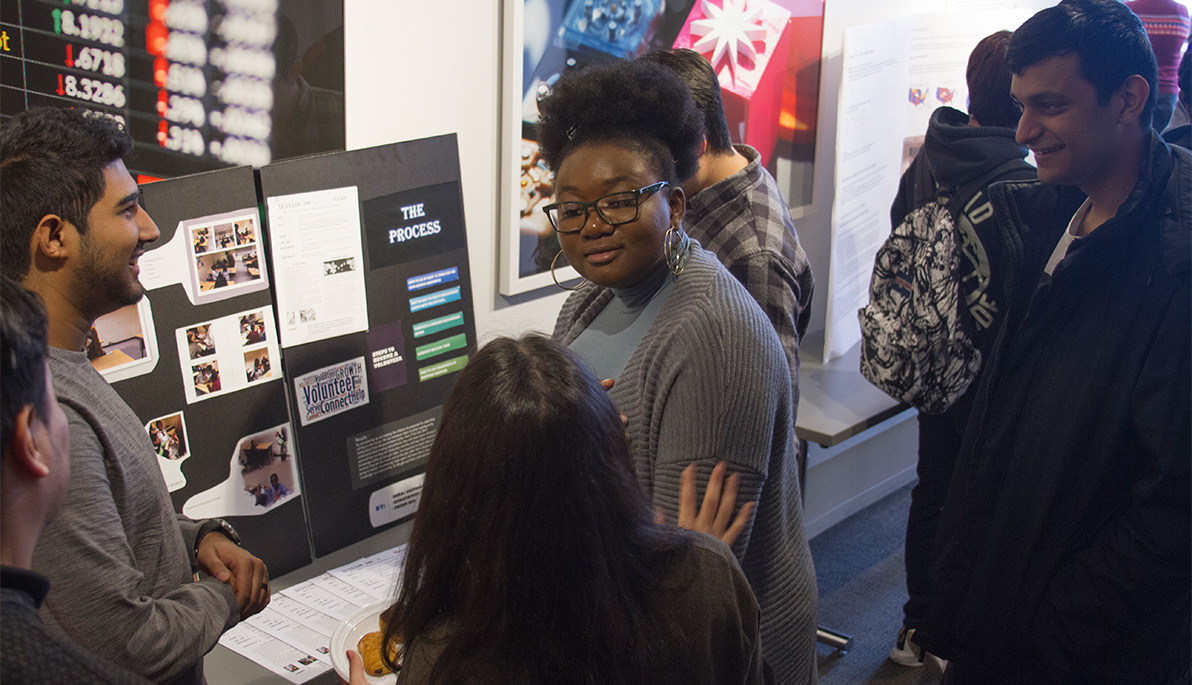News
Lessons From Serving the Community
December 20, 2018
Pictured: (left to right) Preom Deb, Sidpasamde Tiendrebeogo, and Suraj Chitroda present their volunteer project at the Service-Learning Share Fair on the 11th floor of 16 West 61st Street.
When it comes to service learning at NYIT, students are leading the way. Recently, NYIT School of Interdisciplinary Studies and Education and NYIT’s Office of International and Experiential Education presented the second annual, student-produced Service-Learning Conference at the New York City campus. It was an opportunity for NYIT students, many of them freshmen, to present their experiences and reflections working in the community over the course of the fall semester.
“Every undergraduate student at NYIT takes Foundations of Inquiry and Foundations of Scientific Process in their first or second semester, and some of them have a service learning component,” says Luzia Ogureck, associate director of experiential education. “The students go out into the community and volunteer in different projects; we wanted to give them a platform to present what they have been working on.”
Projects included in the conference covered a wide range of techniques, but all were centered on civic engagement and/or STEM learning. For example: one team conducted a mock presidential campaign with 5–8 year-olds in an after school program in Harlem to teach them the basics about American politics. Candidates represented two parties: the Slime Party and the Ice Cream Party, and each party ran on a platform to improve their after-school program. The NYIT students assigned roles to their mentees—politicians, journalists, and electoral officials.
The result was a program that made a lasting impression on the participants that yielded interesting findings. “We learned how hard it is to get people to change parties,” said architecture student Marilyn Corea-Ramirez. “The kids who chose the slime stuck with slime.”
“Trying to describe politics to a young age group has challenges, so we related it to authority figures in their life—like a principal of their school,” explained architecture student Joshua Bahnmiller. Despite the challenges, the students saw great value in the exercise. “Teaching children at a young age sets the foundation and makes it easier for them to understand politics later,” according to computer science major Jimmy Alvear.
Electrical and computer engineering student Samuel Guzman’s team engaged the community with politics in a more direct way by trying to register voters on campus. “We used research methods we learned in class and we noticed a lot of success with things like surveys and questionnaires, especially when we rewarded participation with candy or pizza,” said Guzman. “My views in our political system were really changed. I realized how uninformed people my age are when it comes to voting, including me. After this process, I had new insight into how my voice matters.”
Fellow teammate, biology major Fatima Soomro, added, “Social media can play a huge part in learning and engaging with politics…I think it’s going to play a big role in getting young people to participate and vote, and I am seeing a positive change.”
Other groups represented topics from helping young residents in low-income communities address police brutality to growing hydroponic gardens. And despite the sometimes serious nature of the projects. Computer science major Christopher Yu, who volunteered for an after school program in Harlem, summed it up: “The kids were so eager to learn,” he said.

Students and faculty members at the 2018 Service-Learning conference.
Read more stories about experiential education at NYIT.

By Alix Sobler




